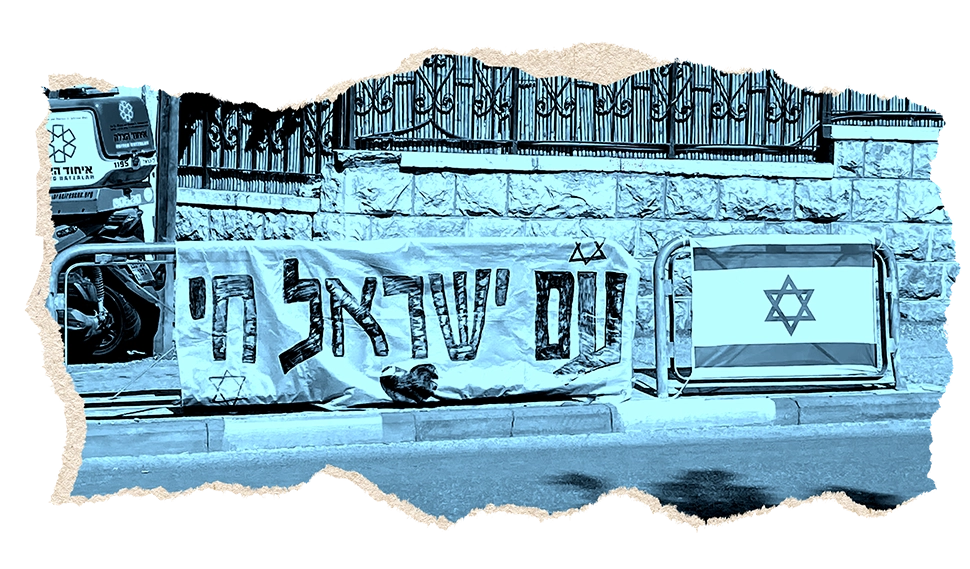When I first heard the theme for this issue of Distinctions was “Unity for Israel,” my initial thought was I couldn’t recall a time when I have seen less unity in Israel than in 2023. In the midst of the unprecedented civic turmoil over the judicial reforms, unity right now feels like a messianic pipe dream.
Taking time to ponder how Israel, in these divisive times, ever might achieve the ancient and elusive goal of unity, I reflected more deeply on one of the crucial ideas of our Jewish tradition — the notion of ideals.
We hear a lot about Jewish values but not as much about Jewish ideals. The word “value” is more finite, more definitive. The word “ideal” is more open-ended; it’s aspirational. It gives us something to reach for. It recognizes that we never will be perfect but that we always can perfect ourselves. When things get really bad — as they are now in Israel — ideals can rescue us by shining a light on that to which we ought to aspire.
What ideals come to mind when I think of my Sephardic tradition? It’s always a tricky game to make generalizations; there is as much diversity within the Sephardi world as one would expect from any community that spans so many countries and centuries.
Undaunted by this limitation, I searched for ideals that could apply to as many Sephardi and Mizrahi Jews as possible, or at least resonate with my own upbringing in Casablanca.
The memory that stands out, above all, from that upbringing is of a tightknit community whose rhythms revolved around Jewish holidays and rituals. But as Jewishly comfortable as we were, we never forgot that we were in a Muslim country. We knew we were guests. Our official status was dhimmis, or subjects, of a Muslim monarchy.
What happens to people when they are guests? Have you ever stayed at a friend’s house? Were you extra careful not to disrupt anything? Being a guest in someone’s house is quite different from being in a private hotel room or in your own home. A guest must always watch his step; a guest can’t get too cocky or demanding.
In Morocco, my ancestors always were aware that they were guests who had little choice but to accept their status. They were guests, in other words, who came to embrace a sense of humility.
It is that ideal of humility — that sober, unglamorous, old-school trait so often overlooked in our modern striving for success — that I ultimately examined as a possible connector to Jewish unity.
As the observance of traditional Judaism was common among the Jews of North Africa and the Middle East, it was hardly a secret that the holiest Jew in the Bible, Moses, was known for his humility, and that humility itself was a valued trait in both the written and oral Torah. For my ancestors, then, humility came naturally — it was the holy thing to do. Thus, being humble guests of Muslim hosts was simply an extension of that Torah observance. As long as we were free to practice our faith, we accepted our reality, a reality that kept us humble.
Despite periods of hostility, persecution and even violence against Jews in Morocco, my forebears never experienced an earth-shattering, traumatic disaster like the Holocaust. So despite the hardships, there remained a sense of relative stability and even kinship with our Arab and Muslim neighbors. Still, we always knew our place. Our collective humility became a way of life that became associated with our continuity.
The birth of a sovereign Jewish state in 1948 severely tested this whole notion of humility. Suddenly, Jews were masters in their own land. Suddenly, Jews no longer were guests; they now were the landlords.
Volumes have been written about the difficult journeys of Jews who migrated from Arab and Muslim lands to the new Jewish state. It is well known that a great number of them suffered discrimination at the hands of Ashkenazi Jews who ran the nascent state and did not know what to make of these “Arab-looking Jews.”
The irony of the early Sephardi and Mizrahi experience in Israel is that, in many ways, they still felt like guests, only now they were guests in their own land. It’s one thing to feel humility in a foreign country; it’s another to feel it in a place to which you’ve been waiting for centuries to return. The natural and holy humility my ancestors nurtured in Casablanca eroded into a bitter and forced humility when they felt mistreated in their own Jewish state.
Being a guest in someone’s house is quite different from being in a private hotel room or in your own home. A guest must always watch his step; a guest can’t get too cocky or demanding. ”
But as difficult as these hardships were, and still are, they reinforce the value of ideals. No matter how bitter we may get, no matter how far astray circumstances may take us, ideals are there as aspirational reminders. For the Jews who discriminated against other Jews, there is the ideal of treating everyone with dignity. For the Jews who were victims of that discrimination, there are the ideals of seeking justice and practicing forgiveness. We all have ideals that spur us to becoming our better selves.
Ideals are like wells in the desert, always ready to provide us with water. But as we wander in that desert, in touch with our thirst, it is vital to know where that water is.
Where is the water for Jewish unity? What ideal can bring us closer to this ancient and elusive goal that is now more urgent than ever? Everyone has answers, but for me, unity starts with, yes, humility.
Maybe I can prove it to you. What is the opposite of humility? Arrogance. What is a key feature of arrogance? The certainty of being right. What divides people more than anything? The certainty that they are right and others are wrong.
This is the atmosphere in Israel today: Israelis are mired in civil strife because every side is certain that it owns the truth.
A rabbi once asked me which Jewish community was more important — the Jews of the Diaspora or the Jews of Israel? I instinctively responded, “the Jews of Israel,” not realizing it was a trick question. “They’re equally important,” he told me, “because we need both to be whole.”
Being in Israel, he explained, fulfills the biblical mandate to return to Zion. Here, the challenge is not to get corrupted by our newfound power. After 2,000 years of wandering as insecure guests in foreign places, just as someone who has not eaten for a long time, it is tempting to gorge on the power that was denied to us for so long. This is why the Jews of Israel need the humility of the Diaspora — the Jews who still don’t have sovereign power. This humility tempers the arrogance that sovereign power breeds; it makes the Jews of Israel whole.
Similarly, the Jews of the Diaspora need the Jews of Israel to remind us of our ultimate destination as Jews. We may be happy in the Diaspora, but we’re still not home. That recognition makes us whole.
In modern-day Israel, despite its extraordinary success in so many areas, the drug of certainty has broken and splintered the Jews. No one is immune from this drug. Whether you are Ashkenazi, Mizrahi, left, right, center, religious, or secular, pretty much everyone is 100% sure that they are 100% right. They’re feasting on power without drinking from the well of humility.
My friend Rabbi Daniel Bouskila recently shared a teaching from Maimonides in which the great sage mentions cases in the Mishnah where one scholar states his opinion and, after hearing another opinion, recants his initial opinion. The key idea, Bouskila told me, is not the recanting but the hearing of another opinion — the deep, honest, genuine hearing of the voice of others, especially those with whom we disagree.
This doesn’t mean people should easily recant; it means we must learn to become better listeners. How do we get there? By first embracing humility. Humility opens us up to the possibility that we may not own the whole truth, that maybe those with whom we disagree may own some of that truth.
Of course, this goes against human nature. It feels so much better to be right than to be wrong. But this feeling of certainty comes with a price. It can make us act in condescending and intolerant ways.
The antidote to that arrogance is, again, to lean on the blessing of humility. The fact it is so difficult is precisely why it is so valuable. After all, in the midst of our verbal battles, when the stakes are so high, who has got time for humility? When we’re so angry at the other side because they are so wrong, who has got time to listen to dissenting voices?
Our ancestors, who surely would have cringed at the current trend of shameless self-promotion, always found time for humility. It was their way of life. Steeped in their tradition, living in foreign lands and with undying faith in the Almighty, they practiced the art of never feeling too superior. They had their human failings like everyone else, but they lived at a time when humility was as much a survival mechanism as a holy aspiration.
We can honor them by borrowing from that humility.
Whether ancient or modern, humility is a mindset. It is the recognition that societies, communities and even relationships never can survive when everyone is determined to get their way. Humility allows us to lower our sights so we can reach a higher plane, the plane of unity.
We may never actually reach it, but the ideal is to always get closer.

Note: The author conceived and wrote this article in August 2023, prior to Hamas waging war in Israel.



